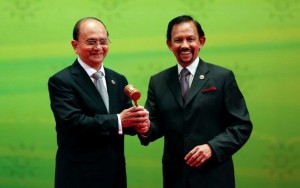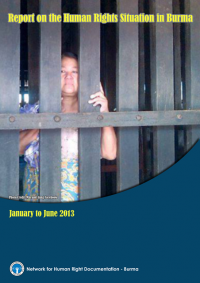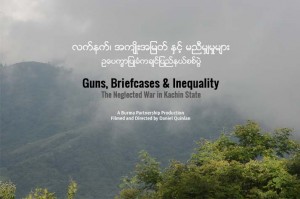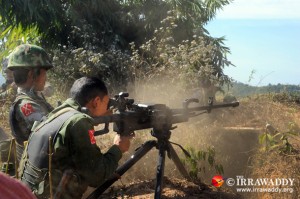Posts Tagged ‘Armed Conflict’ (233 found)
Where is the Benefit for the People of Burma?
 The international community’s praising of the Burma government continues amid serious problems in the country. UN Secretary General Ban Ki-moon commended Burma’s “unprecedented reform” as President Thein Sein accepted the long-awaited ASEAN helm on 10 October in Brunei, an opportunity the country’s leaders were forced to give up in 2006 because of the dire human rights situation at the time.
The international community’s praising of the Burma government continues amid serious problems in the country. UN Secretary General Ban Ki-moon commended Burma’s “unprecedented reform” as President Thein Sein accepted the long-awaited ASEAN helm on 10 October in Brunei, an opportunity the country’s leaders were forced to give up in 2006 because of the dire human rights situation at the time.
Despite the ongoing serious violations of fundamental human rights throughout Burma, ASEAN made the decision of granting Burma the chairmanship in 2011. The grouping of ASEAN itself is shaky and suffering from a big gap in the level of democratization among its member states. ASEAN is also quickly approaching its 2015 deadline for economic integration. Handing the chair in this very important time to a member state in transition can create opportunities for the region as Burma reengages with the West, but on the other hand, the decision is also risky, especially when it entails a chair who will predictably be influenced by China, at least on the matter of the disputed South China Sea […]
Report on the Human Rights Situation in Burma (January 2013 – June 2013)
 Over the six months from January to June 2013, ND-Burma documented 147 human rights violations across Burma. These violations occurred in areas of armed conflict but also in areas covered by ceasefires. Each violation is a specific incident, but it may involve any number of victims, from one victim of killing, to forced labor involving many victims, to the forced displacement of an entire village. ND-Burma’s findings demonstrate that, despite progress in reaching ceasefire agreements with non-state armed groups, the government has made little progress protecting the human rights of its citizens. Furthermore, continued arrests of human rights defenders demonstrate that the government is not serious about working with civil society to protect human rights […]
Over the six months from January to June 2013, ND-Burma documented 147 human rights violations across Burma. These violations occurred in areas of armed conflict but also in areas covered by ceasefires. Each violation is a specific incident, but it may involve any number of victims, from one victim of killing, to forced labor involving many victims, to the forced displacement of an entire village. ND-Burma’s findings demonstrate that, despite progress in reaching ceasefire agreements with non-state armed groups, the government has made little progress protecting the human rights of its citizens. Furthermore, continued arrests of human rights defenders demonstrate that the government is not serious about working with civil society to protect human rights […]
ND-Burma Report Documents On-Going Human Rights Abuse in Burma
The Network for Human Rights Documentation – Burma (ND-Burma) has released a periodic report documenting the human rights situation in Burma during the period of January – June 2013. The report documents 147 cases of human rights violations committed by the government and military throughout Burma […]
• • •Burma Update: Serious Crimes Continue
This briefing paper summarizes crimes that have been committed in Burma over the last year. It details the ongoing abuses and restrictions against Rohingyas, continuing anti-muslim violence, restrictive legislations being used to arrest and prosecute activists, farmed and human rights defenders, and the Burma Army’s offensives against the Kachin Independence Army and other non-state armed groups despite peace agreements.
• • •Burma Refuses To Sign Sexual Violence Declaration
On Tuesday 24th September 115 countries signed a new declaration of commitment to end sexual violence in conflict. Despite high level lobbying by the British government, the government of Burma failed to support the declaration.
The declaration of commitment to end sexual violence in conflict was launched by British Foreign Secretary William Hague and Zainab Hawa Bangura, Special Representative of the Secretary-General on Sexual Violence in Conflict, at the United Nations in New York […]
• • •New Film Calls for Political Dialogue for Lasting Peace in Burma’s Kachin State
To coincide with the International Day of Peace, Burma Partnership launched a new documentary film today entitled, “Guns, Briefcases and Inequality: The Neglected War in Kachin State.” The film demonstrates the need for the government of Burma to engage in meaningful political dialogue with all ethnic nationalities on equal terms, including discussing amendments to the 2008 Constitution. These are necessary in order to address the underlying causes of armed conflict: self-determination, the lack of ethnic rights, and inequality, and to move towards lasting peace throughout the country […]
• • •Documentary Film: “Guns, Briefcases and Inequality: The Neglected War in Kachin State”
 While President Thein Sein is being applauded internationally for his efforts to build peace in Burma, this new documentary film by Burma Partnership questions whether the government’s current process will really lead to sustainable peace and national reconciliation.
While President Thein Sein is being applauded internationally for his efforts to build peace in Burma, this new documentary film by Burma Partnership questions whether the government’s current process will really lead to sustainable peace and national reconciliation.
“Guns, Briefcases and Inequality: The Neglected War in Kachin State” highlights how development projects and natural resource management are exacerbating armed conflict and human rights violations in ethnic areas, without adequate means to justice for the people. The film demonstrates the need for the government of Burma to engage in meaningful political dialogue with all ethnic nationalities on equal terms to address the underlying causes of armed conflict: self-determination, the lack of ethnic rights, and inequality.
Whose Guns Are Silent?: An Analysis of Burma’s Fractured Peace Process
This paper is an analysis of the current situation with recommendations to the parties concerned. It is based on interviews with representatives of ethnic non-state armed groups (NSAGs), community-based organizations and civil society groups. On a state visit to the United Kingdom in July, President Thein Sein stated, “Very possibly, over the coming weeks, we will have a nationwide ceasefire and the guns will go silent everywhere in Myanmar for the first time in more than 60 years.” There is a significant gap in the pronouncements of the Thein Sein government and the realities of the ground situation in Burma’s ethnic areas: this paper seeks to explain that gap […]
• • •Myanmar: Act Now to Prevent Recruitment of Child Soldiers, Following New SC Recommendations
The Myanmar government must act now to implement the recent recommendations issued by the UN Security Council Working Group on children and armed conflict (UNSCWG) to end the recruitment and use of children as soldiers, Child Soldiers International said today. On 16 August 2013, the UNSCWG released its conclusions on children and armed conflict in Myanmar, urging the Myanmar government to take specific measures to protect children from unlawful recruitment by the Myanmar military and armed groups, and thereby live up to its commitments to bring a definitive end to underage recruitment in the country […]
• • •Whose Guns Are Silent?
 As President Thein Sein once again claimed success in the peace process, the United Nations Special Rapporteur on the situation of human rights in Burma, Tomás Ojea Quintana, was denied permission to visit the active warzone in Kachin State, illustrating the gap between words and reality.
As President Thein Sein once again claimed success in the peace process, the United Nations Special Rapporteur on the situation of human rights in Burma, Tomás Ojea Quintana, was denied permission to visit the active warzone in Kachin State, illustrating the gap between words and reality.
In President Thein Sein’s address for swearing in new deputy ministers on 15 August, he stated that “the guns have gone silent,” echoing his remarks on his visit to the UK in July where he asserted that “very possibly, over the coming weeks, we will have a nationwide ceasefire and the guns will go silent everywhere in Myanmar for the first time in more than 60 years.” The reality is that the guns of the Burma Army are far from silent, and the ethnic people, particularly in Kachin State and northern Shan State, are suffering more under Thein Sein than the previous military regime headed by Than Shwe […]









 All posts
All posts